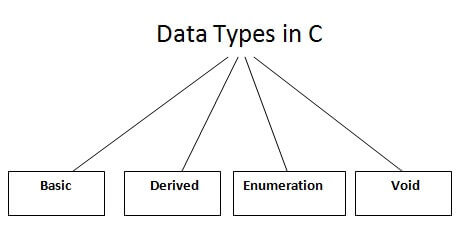Data Types in C
A data type specifies the type of data that a variable can store such as integer, floating, character, etc.

Data types specify how we enter data into our programs and what type of data we enter. C language has some predefined set of data types to handle various kinds of data that we can use in our program. These datatypes have different storage capacities.
C language supports 2 different type of data types:
- Primary data types:
These are fundamental data types in C namely integer(
int), floating point(float), character(char) andvoid. - Derived data types:
Derived data types are nothing but primary datatypes but a little twisted or grouped together like array, stucture, union and pointers. These are discussed in details later.
Data type determines the type of data a variable will hold. If a variable x is declared as int. it means x can hold only integer values. Every variable which is used in the program must be declared as what data-type it is.
Integer type
Integers are used to store whole numbers.
Size and range of Integer type on 16-bit machine:
| Type | Size(bytes) | Range |
|---|---|---|
| int or signed int | 2 | -32,768 to 32767 |
| unsigned int | 2 | 0 to 65535 |
| short int or signed short int | 1 | -128 to 127 |
| unsigned short int | 1 | 0 to 255 |
| long int or signed long int | 4 | -2,147,483,648 to 2,147,483,647 |
| unsigned long int | 4 | 0 to 4,294,967,295 |
Floating point type
Floating types are used to store real numbers.
Size and range of Integer type on 16-bit machine
| Type | Size | Range |
|---|---|---|
| Float | 4 | 3.4E-38 to 3.4E+38 |
| double | 8 | 1.7E-308 to 1.7E+308 |
| long double | 10 | 3.4E-4932 to 1.1E+4932 |
Character type
Character types are used to store characters value.
Size and range of Integer type on 16-bit machine
| Type | Size | Range |
|---|---|---|
| char or signed char | 1 | -128 to 127 |
| unsigned char | 1 | 0 to 255 |

